《高级英语》课程教学资源(试卷习题)第六套试卷(试题)
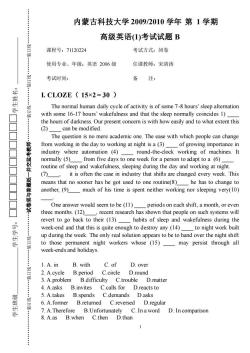
内蒙古科技大学2009/2010学年第1学期 高级英语(1)考试试题B 课程号:71120224 考试方式:闭卷 使用专业、年级:英语2006级 任课教师:宋清涛 考试时间: 备 注: L.CL0ZE(15×2=30) The normal human daily cycle of activity is of some 7-8 hours'sleep alternation with some 16-17 hours'wakefulness and that the sleep normally coincides 1) the hours of darkness.Our present concern is with how easily and to what extent this (2) can be modified. The question is no mere academic one.The ease with which people can change from working in the day to working at night is a (3)of growing importance in industry where automation (4)_ round-the-clock working of machines.It normally(5)from five days to one week for a person to adapt to a (6) routine of sleep and wakefulness,sleeping during the day and working at night. (7)】 it is often the case in industry that shifts are changed every week.This 岛 means that no sooner has he got used to one routine(8)he has to change to 和 another,(9)much of his time is spent neither working nor sleeping very(10) One answer would seem to be(11)periods on each shift,a month,or even three months.(12),recent research has shown that people on such systems will : revert to go back to their(13)habits of sleep and wakefulness during the : week-end and that this is quite enough to destroy any (14) to night work built up during the week.The only real solution appears to be to hand over the night shift 剂 to those permanent night workers whose (15) may persist through all week-ends and holidays. 1.A.in B.with C.of D.over 2.A.cycle B.period C.circle D.round 3.A.problem B.difficulty C.trouble D.matter 4.A.asks B.invites C.calls for D.reacts to 5.A.takes B.spends C.demands D.asks 6.A.former B.returned C.reversed D.regular 7.A.Therefore B.Unfortunately C.In a word D.In comparison 8.A.as B.when C.then D.than
1 内蒙古科技大学 2009/2010 学年 第 1 学期 高级英语(1)考试试题 B 课程号:71120224 考试方式:闭卷 使用专业、年级:英语 2006 级 任课教师:宋清涛 考试时间: 备 注: I. CLOZE( 15×2 = 30 ) The normal human daily cycle of activity is of some 7-8 hours’sleep alternation with some 16-17 hours’ wakefulness and that the sleep normally coincides 1) _ the hours of darkness. Our present concern is with how easily and to what extent this (2) _ can be modified. The question is no mere academic one. The ease with which people can change from working in the day to working at night is a (3) _ of growing importance in industry where automation (4) _ round-the-clock working of machines. It normally (5)_ from five days to one week for a person to adapt to a (6) _ routine of sleep and wakefulness, sleeping during the day and working at night. (7)_, it is often the case in industry that shifts are changed every week. This means that no sooner has he got used to one routine(8)_ he has to change to another, (9)_ much of his time is spent neither working nor sleeping very(10) _. One answer would seem to be (11) _ periods on each shift, a month, or even three months. (12)_, recent research has shown that people on such systems will revert to go back to their (13) _ habits of sleep and wakefulness during the week-end and that this is quite enough to destroy any (14) _ to night work built up during the week. The only real solution appears to be to hand over the night shift to those permanent night workers whose (15) _ may persist through all week-ends and holidays. 1. A. in B. with C. of D. over 2. A.cycle B.period C.circle D.round 3. A.problem B.difficulty C.trouble D.matter 4. A.asks B.invites C.calls for D.reacts to 5. A.takes B.spends C.demands D.asks 6. A.former B.returned C.reversed D.regular 7. A.Therefore B.Unfortunately C. In a word D. In comparison 学生班级 8. A.as B.when C.then D.than _学生学号:□□□□□□□□□□□ □学生姓名:_ .装订线.装订线.装订线.试卷须与答题纸一并交监考教师.装订线.装订线.装订线

9.A.though B.so that C.while D.as 10.A.efficiently B.good C.easily D.happily 11.A.shorter B.better C.longer D.nicer 12.A.So B.In short C.Similarly D.However 13.A.new B.normal C.temporary D.favourite 14.A.change B.return C.adaptation D.tendency 15.A.wakefulness B.sleep C.preference D.habit Ⅱ.Reading comprehension(15×2=30) TEXTA In the case of mobile phones,change is everything.Recent research indicates that the mobile phone is changing not only our culture,but our very bodies as well. First,let's talk about culture.The difference between the mobile phone and its parent,the fixed-line phone,you get whoever answers it. This has several implications.The most common one,however,and perhaps the thing that has changed our culture forever,is the "meeting"influence.People no longer need to make firm plans about when and where to meet.Twenty years ago,a Friday night would need to be arranged in advance.You needed enough time to allow everyone to get from their place of work to the first meeting place.Now, however,a night out can be arranged on the run.It is no longer "see you there at 8", but"text me around 8 and we'll see where we all are". Texting changes people as well.In their paper,"insights into the Social and Psychological Effects of SMS Text Messaging",two British researchers distinguished between two types of mobile phone users:the "talkers"and the texters"-those who prefer voice to text message and those who prefer text to voice. They found that the mobile phone's individuality and privacy gave texters the ability to express a whole new outer personality.Texters were likely to report that their family would be surprised if they were to read their texts.This suggests that texting allowed texters to present a self-image that differed from the one familiar to those who knew them well. Another scientist wrote of the changes that mobiles have brought to body language.There are two kinds that people use while speaking on the phone.There is the"speakeasy":the head is held high,in a self-confident way,chatting away.And there is the "spacemaker":these people focus on themselves and keep out other people. Who can blame them?Phone meetings get cancelled or reformed and camera-phones intrude on people's privacy.So,it is understandable if your mobile makes you nervous.But perhaps you needn't worry so much.After all,it is good to talk
2 9. A.though B.so that C.while D.as 10. A.efficiently B.good C.easily D.happily 11. A.shorter B.better C.longer D.nicer 12. A.So B.In short C.Similarly D.However 13. A.new B.normal C.temporary D.favourite 14. A.change B.return C.adaptation D.tendency 15. A.wakefulness B.sleep C.preference D.habit II. Reading comprehension ( 15×2 = 30 ) TEXT A In the case of mobile phones, change is everything. Recent research indicates that the mobile phone is changing not only our culture, but our very bodies as well. First, let’s talk about culture. The difference between the mobile phone and its parent, the fixed-line phone, you get whoever answers it. This has several implications. The most common one, however, and perhaps the thing that has changed our culture forever, is the “meeting” influence. People no longer need to make firm plans about when and where to meet. Twenty years ago, a Friday night would need to be arranged in advance. You needed enough time to allow everyone to get from their place of work to the first meeting place. Now, however, a night out can be arranged on the run. It is no longer “see you there at 8”, but “text me around 8 and we’ll see where we all are”. Texting changes people as well. In their paper, “insights into the Social and Psychological Effects of SMS Text Messaging”, two British researchers distinguished between two types of mobile phone users: the “talkers” and the “texters”-those who prefer voice to text message and those who prefer text to voice. They found that the mobile phone’s individuality and privacy gave texters the ability to express a whole new outer personality. Texters were likely to report that their family would be surprised if they were to read their texts. This suggests that texting allowed texters to present a self-image that differed from the one familiar to those who knew them well. Another scientist wrote of the changes that mobiles have brought to body language. There are two kinds that people use while speaking on the phone. There is the “speakeasy”: the head is held high, in a self-confident way, chatting away. And there is the “spacemaker”: these people focus on themselves and keep out other people. Who can blame them? Phone meetings get cancelled or reformed and camera-phones intrude on people’s privacy. So, it is understandable if your mobile makes you nervous. But perhaps you needn’t worry so much. After all, it is good to talk
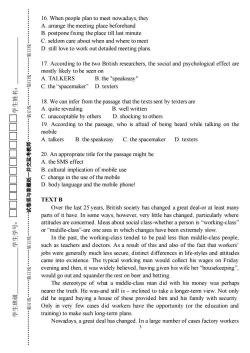
16.When people plan to meet nowadays,they A.arrange the meeting place beforehand B.postpone fixing the place till last minute C.seldom care about when and where to meet D.still love to work out detailed meeting plans 17.According to the two British researchers,the social and psychological effect are mostly likely to be seen on A.TALKERS B.the "speakeasy" C.the“spacemaker'”D.texters 18.We can infer from the passage that the texts sent by texters are A.quite revealing B.well written C.unacceptable by others D.shocking to others 19.According to the passage,who is afraid of being heard while talking on the mobile A.talkers B.the speakeasy C.the spacemaker D.texters 20.An appropriate title for the passage might be A.the SMS effect B.cultural implication of mobile use 忠 C.change in the use of the mobile D.body language and the mobile phone! 纯 TEXT B 幕 Over the last 25 years,British society has changed a great deal-or at least many parts of it have.In some ways,however,very little has changed,particularly where attitudes are concerned.Ideas about social class-whether a person is"working-class" : or"middle-class"-are one area in which changes have been extremely slow. 出 In the past,the working-class tended to be paid less than middle-class people, such as teachers and doctors.As a result of this and also of the fact that workers jobs were generally much less secure,distinct differences in life-styles and attitudes came into existence.The typical working man would collect his wages on Friday evening and then,it was widely believed,having given his wife her"housekeeping", 3 would go out and squander the rest on beer and betting. The stereotype of what a middle-class man did with his money was perhaps nearer the truth.He was-and still is-inclined to take a longer-term view.Not only did he regard buying a house of these provided him and his family with security. Only in very few cases did workers have the opportunity (or the education and training)to make such long-term plans. Nowadays,a great deal has changed.In a large number of cases factory workers
3 16. When people plan to meet nowadays, they A. arrange the meeting place beforehand B. postpone fixing the place till last minute C. seldom care about when and where to meet D. still love to work out detailed meeting plans. 17. According to the two British researchers, the social and psychological effect are mostly likely to be seen on A. TALKERS B. the "speakeasy" C. the “spacemaker” D. texters 18. We can infer from the passage that the texts sent by texters are A. quite revealing B. well written C. unacceptable by others D. shocking to others 19. According to the passage, who is afraid of being heard while talking on the mobile A. talkers B. the speakeasy C. the spacemaker D. texters 20. An appropriate title for the passage might be A. the SMS effect B. cultural implication of mobile use C. change in the use of the mobile D. body language and the mobile phone! TEXT B Over the last 25 years, British society has changed a great deal-or at least many parts of it have. In some ways, however, very little has changed, particularly where attitudes are concerned. Ideas about social class-whether a person is “working-class” or “middle-class”-are one area in which changes have been extremely slow. In the past, the working-class tended to be paid less than middle-class people, such as teachers and doctors. As a result of this and also of the fact that workers’ jobs were generally much less secure, distinct differences in life-styles and attitudes came into existence. The typical working man would collect his wages on Friday evening and then, it was widely believed, having given his wife her “housekeeping”, would go out and squander the rest on beer and betting. The stereotype of what a middle-class man did with his money was perhaps nearer the truth. He was-and still is – inclined to take a longer-term view. Not only did he regard buying a house of these provided him and his family with security. Only in very few cases did workers have the opportunity (or the education and training) to make such long-term plans. Nowadays, a great deal has changed. In a large number of cases factory workers 学生班级_学生学号:□□□□□□□□□□□ □学生姓名:_ .装订线.装订线.装订线.试卷须与答题纸一并交监考教师.装订线.装订线.装订线
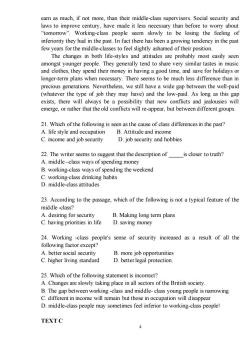
earn as much,if not more,than their middle-class supervisors.Social security and laws to improve century,have made it less necessary than before to worry about "tomorrow".Working-class people seem slowly to be losing the feeling of inferiority they had in the past.In fact there has been a growing tendency in the past few years for the middle-classes to feel slightly ashamed of their position. The changes in both life-styles and attitudes are probably most easily seen amongst younger people.They generally tend to share very similar tastes in music and clothes,they spend their money in having a good time,and save for holidays or longer-term plans when necessary.There seems to be much less difference than in precious generations.Nevertheless,we still have a wide gap between the well-paid (whatever the type of job they may have)and the low-paid.As long as this gap exists,there will always be a possibility that new conflicts and jealousies will emerge,or rather that the old conflicts will re-appear,but between different groups. 21.Which of the following is seen as the cause of class differences in the past? A.life style and occupation B.Attitude and income C.income and job security D.job security and hobbies 22.The writer seems to suggest that the description of is closer to truth? A.middle-class ways of spending money B.working-class ways of spending the weekend C.working-class drinking habits D.middle-class attitudes 23.According to the passage,which of the following is not a typical feature of the middle-class? A.desiring for security B.Making long term plans C.having priorities in life D.saving money 24.Working -class people's sense of security increased as a result of all the following factor except? A.better social security B.more job opportunities C.higher living standard D.better legal protection. 25.Which of the following statement is incorrect? A.Changes are slowly taking place in all sectors of the British society B.The gap between working-class and middle-class young people is narrowing C.different in income will remain but those in occupation will disappear D.middle-class people may sometimes feel inferior to working-class people! TEXT C
4 earn as much, if not more, than their middle-class supervisors. Social security and laws to improve century, have made it less necessary than before to worry about “tomorrow”. Working-class people seem slowly to be losing the feeling of inferiority they had in the past. In fact there has been a growing tendency in the past few years for the middle-classes to feel slightly ashamed of their position. The changes in both life-styles and attitudes are probably most easily seen amongst younger people. They generally tend to share very similar tastes in music and clothes, they spend their money in having a good time, and save for holidays or longer-term plans when necessary. There seems to be much less difference than in precious generations. Nevertheless, we still have a wide gap between the well-paid (whatever the type of job they may have) and the low-paid. As long as this gap exists, there will always be a possibility that new conflicts and jealousies will emerge, or rather that the old conflicts will re-appear, but between different groups. 21. Which of the following is seen as the cause of class differences in the past? A. life style and occupation B. Attitude and income C. income and job security D. job security and hobbies 22. The writer seems to suggest that the description of _is closer to truth? A. middle –class ways of spending money B. working-class ways of spending the weekend C. working-class drinking habits D. middle-class attitudes 23. According to the passage, which of the following is not a typical feature of the middle -class? A. desiring for security B. Making long term plans C. having priorities in life D.saving money 24. Working -class people's sense of security increased as a result of all the following factor except? A. better social security B. more job opportunities C. higher living standard D. better legal protection. 25. Which of the following statement is incorrect? A. Changes are slowly taking place in all sectors of the British society. B. The gap between working -class and middle- class young people is narrowing C. different in income will remain but those in occupation will disappear D. middle-class people may sometimes feel inferior to working-class people! TEXT C
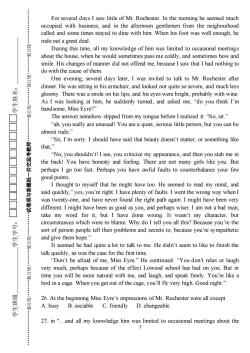
For several days I saw little of Mr.Rochester.In the morning he seemed much occupied with business,and in the afternoon gentlemen from the neighourhood called and some times stayed to dine with him.When his foot was well enough,he rode out a great deal. 留 During this time,all my knowledge of him was limited to occasional meetings about the house,when he would sometimes pass me coldly,and sometimes bow and smile.His changes of manner did not offend me,because I saw that I had nothing to do with the cause of them. One evening,several days later,I was invited to talk to Mr.Rochester after dinner.He was sitting in his armchair,and looked not quite so severe,and much less gloomy.There was a smile on his lips,and his eyes were bright,probably with wine. As I was looking at him,he suddenly turned,and asked me,"do you think I'm 剂 handsome,Miss Eyre?" The answer somehow slipped from my tongue before I realized it:No,sir." "ah,you really are unusual!You are a quiet,serious little person,but you can be almost rude.” "Sir,I'm sorry.I should have said that beauty doesn't matter,or something like 焉 that." "No,you shouldn't!I see,you criticize my appearance,and then you stab me in the back!You have honesty and feeling.There are not many girls like you.But perhaps I go too fast.Perhaps you have awful faults to counterbalance your few 忠 good points. I thought to myself that he might have too.He seemed to read my mind,and 茹 T said quickly,"yes,you're right.I have plenty of faults.I went the wrong way whenI was twenty-one,and have never found the right path again.I might have been very different.I might have been as good as you,and perhaps wiser.I am not a bad man, : take my word for it,but I have done wrong.It wasn't my character,but : circumstances which were to blame.Why do I tell you all this?Because you're the sort of person people tell their problems and secrets to,because you're sympathetic 出 and give them hope.” It seemed he had quite a lot to talk to me.He didn't seem to like to finish the talk quickly,as was the case for the first time. "Don't be afraid of me,Miss Eyre."He continued."You don't relax or laugh very much,perhaps because of the effect Lowood school has had on you.But in time you will be more natural with me,and laugh,and speak freely.You're like a bird in a cage.When you get out of the cage,you'll fly very high.Good night." 26.At the beginning Miss Eyre's impressions of Mr.Rochester were all except A.busy B.sociable C.friendly D.changeable 27.in ".and all my knowledge him was limited to occasional meetings about the 5
5 For several days I saw little of Mr. Rochester. In the morning he seemed much occupied with business, and in the afternoon gentlemen from the neighourhood called and some times stayed to dine with him. When his foot was well enough, he rode out a great deal. During this time, all my knowledge of him was limited to occasional meetings about the house, when he would sometimes pass me coldly, and sometimes bow and smile. His changes of manner did not offend me, because I saw that I had nothing to do with the cause of them. One evening, several days later, I was invited to talk to Mr. Rochester after dinner. He was sitting in his armchair, and looked not quite so severe, and much less gloomy. There was a smile on his lips, and his eyes were bright, probably with wine. As I was looking at him, he suddenly turned, and asked me, “do you think I’m handsome, Miss Eyre?” The answer somehow slipped from my tongue before I realized it: ‘No, sir.” “ah, you really are unusual! You are a quiet, serious little person, but you can be almost rude.” “Sir, I’m sorry. I should have said that beauty doesn’t matter, or something like that,” “No, you shouldn’t! I see, you criticize my appearance, and then you stab me in the back! You have honesty and feeling. There are not many girls like you. But perhaps I go too fast. Perhaps you have awful faults to counterbalance your few good points. I thought to myself that he might have too. He seemed to read my mind, and said quickly,” yes, you’re right. I have plenty of faults. I went the wrong way when I was twenty-one, and have never found the right path again. I might have been very different. I might have been as good as you, and perhaps wiser. I am not a bad man, take my word for it, but I have done wrong. It wasn’t my character, but circumstances which were to blame. Why do I tell you all this? Because you’re the sort of person people tell their problems and secrets to, because you’re sympathetic and give them hope.” It seemed he had quite a lot to talk to me. He didn’t seem to like to finish the talk quickly, as was the case for the first time. “Don’t be afraid of me, Miss Eyre.” He continued. “You don’t relax or laugh very much, perhaps because of the effect Lowood school has had on you. But in time you will be more natural with me, and laugh, and speak freely. You’re like a bird in a cage. When you get out of the cage, you’ll fly very high. Good night.” 26. At the beginning Miss Eyre’s impressions of Mr. Rochester were all except A. busy B. sociable C. friendly D. changeable 27. in ".and all my knowledge him was limited to occasional meetings about the 学生班级_学生学号:□□□□□□□□□□□ □学生姓名:_ .装订线.装订线.装订线.试卷须与答题纸一并交监考教师.装订线.装订线.装订线
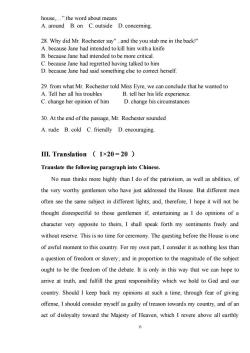
house,.".the word about means A.around B.on C.outside D.concerning. 28.Why did Mr.Rochester say".and the you stab me in the back!" A.because Jane had intended to kill him with a knife B.because Jane had intended to be more critical. C.because Jane had regretted having talked to him D.because Jane had said something else to correct herself. 29.from what Mr.Rochester told Miss Eyre,we can conclude that he wanted to A.Tell her all his troubles B.tell her his life experience. C.change her opinion of him D.change his circumstances 30.At the end of the passage,Mr.Rochester sounded A.rude B.cold C.friendly D.encouraging Π.Translation(1×20=20) Translate the following paragraph into Chinese. No man thinks more highly than I do of the patriotism,as well as abilities,of the very worthy gentlemen who have just addressed the House.But different men often see the same subject in different lights;and,therefore,I hope it will not be thought disrespectful to those gentlemen if,entertaining as I do opinions of a character very opposite to theirs,I shall speak forth my sentiments freely and without reserve.This is no time for ceremony.The questing before the House is one of awful moment to this country.For my own part,I consider it as nothing less than a question of freedom or slavery;and in proportion to the magnitude of the subject ought to be the freedom of the debate.It is only in this way that we can hope to arrive at truth,and fulfill the great responsibility which we hold to God and our country.Should I keep back my opinions at such a time,through fear of giving offense,I should consider myself as guilty of treason towards my country,and of an act of disloyalty toward the Majesty of Heaven,which I revere above all earthly 6
6 house,.”.the word about means A. around B. on C. outside D. concerning. 28. Why did Mr. Rochester say" .and the you stab me in the back!" A. because Jane had intended to kill him with a knife B. because Jane had intended to be more critical. C. because Jane had regretted having talked to him D. because Jane had said something else to correct herself. 29. from what Mr. Rochester told Miss Eyre, we can conclude that he wanted to A. Tell her all his troubles B. tell her his life experience. C. change her opinion of him D. change his circumstances 30. At the end of the passage, Mr. Rochester sounded A. rude B. cold C. friendly D. encouraging. III. Translation ( 1×20 = 20 ) Translate the following paragraph into Chinese. No man thinks more highly than I do of the patriotism, as well as abilities, of the very worthy gentlemen who have just addressed the House. But different men often see the same subject in different lights; and, therefore, I hope it will not be thought disrespectful to those gentlemen if, entertaining as I do opinions of a character very opposite to theirs, I shall speak forth my sentiments freely and without reserve. This is no time for ceremony. The questing before the House is one of awful moment to this country. For my own part, I consider it as nothing less than a question of freedom or slavery; and in proportion to the magnitude of the subject ought to be the freedom of the debate. It is only in this way that we can hope to arrive at truth, and fulfill the great responsibility which we hold to God and our country. Should I keep back my opinions at such a time, through fear of giving offense, I should consider myself as guilty of treason towards my country, and of an act of disloyalty toward the Majesty of Heaven, which I revere above all earthly
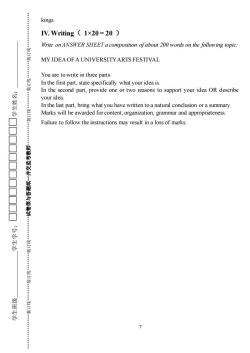
kings. IV.Writing 1x20=20 Write on ANSWER SHEET a composition ofabout 200 words on the following topic: MY IDEA OF A UNIVERSITY ARTS FESTIVAL You are to write in three parts In the first part,state specifically what your idea is. In the second part,provide one or two reasons to support your idea OR describe your idea. In the last part,bring what you have written to a natural conclusion or a summary. Marks will be awarded for content,organization,grammar and appropriateness. Failure to follow the instructions may result in a loss of marks
7 kings. IV. Writing( 1×20 = 20 ) Write on ANSWER SHEET a composition of about 200 words on the following topic: MY IDEA OF A UNIVERSITY ARTS FESTIVAL You are to write in three parts. In the first part, state specifically what your idea is. In the second part, provide one or two reasons to support your idea OR describe your idea. In the last part, bring what you have written to a natural conclusion or a summary. Marks will be awarded for content, organization, grammar and appropriateness. Failure to follow the instructions may result in a loss of marks. 学生班级_学生学号:□□□□□□□□□□□ □学生姓名:_ .装订线.装订线.装订线.试卷须与答题纸一并交监考教师.装订线.装订线.装订线

8
按次数下载不扣除下载券;
注册用户24小时内重复下载只扣除一次;
顺序:VIP每日次数-->可用次数-->下载券;
- 《高级英语》课程教学资源(试卷习题)第五套试卷(试题).doc
- 《高级英语》课程教学资源(试卷习题)第二套试卷(试题).doc
- 《高级英语》课程教学资源(试卷习题)第三套试卷(试题).doc
- 《高级英语》课程教学资源(试卷习题)第一套试卷(试题).doc
- 《高级英语》课程授课教案(第六册)Unit 10 Two Truths to Live By Alexander M. Schindler.doc
- 《高级英语》课程授课教案(第六册)Unit 6 Matriculation Fixation Joe Queenan.doc
- 《高级英语》课程授课教案(第六册)Unit 8 Being There Anatole Broyard.doc
- 《高级英语》课程授课教案(第六册)Unit 7 A Few Kind Words for Superstition Robertson Davies.doc
- 《高级英语》课程授课教案(第六册)Unit 3 Bards of the Internet By Phillip Elmer-Dewitt.doc
- 《高级英语》课程授课教案(第六册)Unit 2 A Class Act Florence Cartlidge.doc
- 《高级英语》课程授课教案(第六册)Unit 9 I’d Rather Be Black Than Female Shirley Chisholm.doc
- 《高级英语》课程授课教案(第六册)Unit 5 What Are Our Real Values? By Nicols Fox.doc
- 《高级英语》课程授课教案(第六册)Unit 4 Disney World - Cities of Simulation as Postmodern Utopias Ken Sanes.doc
- 《高级英语》课程授课教案(第六册)Unit 1 Technology in Reverse Robert J. Samuelson.doc
- 《高级英语》课程授课教案(第五册)Unit 10 Love and Resentment Barbara Bick.doc
- 《高级英语》课程授课教案(第五册)Unit 7 How America Lives James A. Michener.doc
- 《高级英语》课程授课教案(第五册)Unit 6 Give me Liberty or Give me Death Patrick Henry.doc
- 《高级英语》课程授课教案(第五册)Unit 3 A Hanging George Orwell.doc
- 《高级英语》课程授课教案(第五册)Unit 2 The Struggle to Be an All-American Girl Elizabeth Wong.doc
- 《高级英语》课程授课教案(第五册)Unit 9 Pigskin English Robert MacNeil.doc
- 《高级英语》课程教学资源(试卷习题)第四套试卷(试题).doc
- 《高级英语》课程教学资源(试卷习题)第一套试卷(答案).doc
- 《高级英语》课程教学资源(试卷习题)第三套试卷(答案).doc
- 《高级英语》课程教学资源(试卷习题)第二套试卷(答案).doc
- 《高级英语》课程教学资源(试卷习题)第五套试卷(答案).doc
- 《高级英语》课程教学资源(试卷习题)第六套试卷(答案).doc
- 《高级英语》课程教学资源(试卷习题)第四套试卷(答案).doc
- 《高级英语》课程教学资源(试卷习题)第五册 Unit 1 习题(试题).doc
- 《高级英语》课程教学资源(试卷习题)第五册 Unit 2 习题(试题).doc
- 《高级英语》课程教学资源(试卷习题)第五册 Unit 3 习题(试题).doc
- 《高级英语》课程教学资源(试卷习题)第五册 Unit 4 习题(试题).doc
- 《高级英语》课程教学资源(试卷习题)第五册 Unit 5 习题(试题).doc
- 《高级英语》课程教学资源(试卷习题)第五册 Unit 6 习题(试题).docx
- 《高级英语》课程教学资源(试卷习题)第五册 Unit 7 习题(试题).docx
- 《高级英语》课程教学资源(试卷习题)第五册 Unit 8 习题(试题).docx
- 《高级英语》课程教学资源(试卷习题)第五册 Unit 9 习题(试题).doc
- 《高级英语》课程教学资源(试卷习题)第五册 Unit 10 习题(试题).doc
- 《高级英语》课程教学资源(试卷习题)第五册 Unit 1 习题(答案).doc
- 《高级英语》课程教学资源(试卷习题)第五册 Unit 2 习题(答案).doc
- 《高级英语》课程教学资源(试卷习题)第五册 Unit 3 习题(答案).doc
